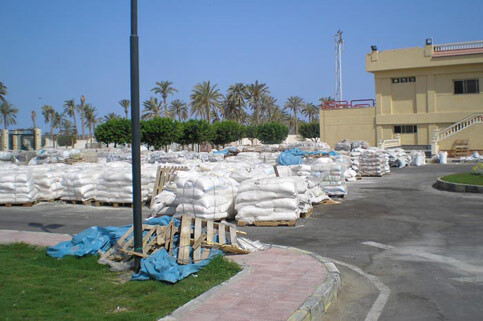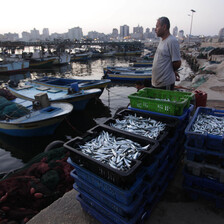The Electronic Intifada 2 June 2009

Sacks of Gaza aid remain exposed in al-Arish. (Lina Atallah/IRIN)
AL-ARISH (IRIN) - The lack of proper warehousing facilities in the northeastern Egyptian cities of al-Arish and Rafah is partly to blame for bottlenecks and inefficiencies in delivering food and other aid to the Gaza Strip, a former senior Egyptian aid official has said.
The only working warehouse in al-Arish had been part-rented to the World Food Programme (WFP) with only some of its space allocated to the Egyptian Red Crescent Society (ERCS), said Ahmed Orabi, head of Egyptian Red Crescent aid operations between June 2008 and April 2009. Not all of the donated food aid arriving in al-Arish could be stored appropriately, and this had led to some wastage, he said.
The coastal city of al-Arish has been a major hub for incoming aid donations during and after the Israeli offensive (27 December 2008 - 18 January 2009). The ERCS works in close partnership with WFP to facilitate the passage of goods into Gaza for UN agencies and non-governmental organizations.
Bekim Mahmuti, head of logistics with WFP’s program in the Occupied Palestinian Territories, told IRIN they had encountered no warehousing or access problems in al-Arish. “Our aid was locally purchased in Egypt and stockpiled in our warehouse in al-Arish. It successfully reached Gaza,” Mahmuti said from East Jerusalem. He added that WFP had no food aid left in al-Arish by mid-May.
Other reasons for delays and difficulties in getting aid into Gaza are the frequent and unscheduled closures of the Rafah crossing, and the circuitous route that some aid has to take.
Significant quantities of aid — mainly from Arab and Muslim countries — have had to be trucked from al-Arish to al-Ouja (50km from Rafah on the Israeli-Egyptian border) and then to Israel’s Kerem Shalom crossing into Gaza, according to the January 2009 Regional Humanitarian Update of the UN Office for the Coordination of Humanitarian Affairs (OCHA).
Kerem Shalom has become the main entry point for aid arriving from Israel, but it was not designed to handle large quantities of aid, and strict Israeli controls limit the speed with which goods can be handled.
Rafah has been used mainly for medical aid, and Kerem Shalom for food and other aid.
Incorrect documents
An insight into some of the other impediments to smooth aid delivery to Gaza can be gleaned from OCHA’s January 2009 update:
“Many donations arrived in al-Arish without proper documentation or indication of a consignee. This has impaired their transfer to Gaza. As of 31 January, 3,000 tons of humanitarian supplies, which had crossed into Israel via al-Ouja was stockpiled at the Kerem Shalom terminal due to lack of clearance to enter Gaza. This situation has prompted border authorities at al-Ouja not to accept humanitarian cargo that has no proper documentation. Many truck drivers had no other options but to return to al-Arish and unload their shipments at the municipal stadium. An estimated 12,000 metric tons of humanitarian supplies have accumulated at the stadium as a result.”
Earlier this month an IRIN correspondent saw sacks of food aid lying on the ground in the main sports stadium of al-Arish. They were believed to be remnants of the usable aid still waiting to be shipped to Gaza.
Dumped food aid
Orabi estimates that since the Israeli offensive on Gaza ended on 18 January 2009, 100 tons of food aid destined for Gaza has had to be dumped on rubbish tips. Most of the food had been unable to be warehoused and had gone bad with exposure to the rain and sun, he said.
“The aid was thrown away in a garbage lot and was most probably picked up by Bedouins to use as fodder for their goats,” he added.
Mahmoud Abul Magd, head of the ERCS office in al-Arish, said most of the dumped aid was part of a Libyan convoy.
About 100 trucks of Libyan aid had arrived in al-Arish during the Israeli offensive but many had been over the weight limit and were thus denied access to Gaza. Some of this aid was channeled through the al-Ouja border crossing after having been repackaged to meet the correct weight standards, he said.
However, Abul Magd said the current stock of unused food and medical aid was “negligible.”
A clearer picture may be difficult to discern as journalists have been denied access al-Arish sea port and the airport, places where more aid is believed to be stored.
This item comes to you via IRIN, a UN humanitarian news and information service, but may not necessarily reflect the views of the United Nations or its agencies. All IRIN material may be reposted or reprinted free-of-charge; refer to the copyright page for conditions of use. IRIN is a project of the UN Office for the Coordination of Humanitarian Affairs.


